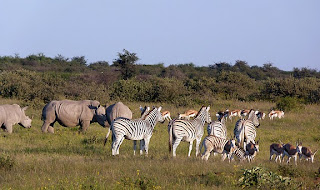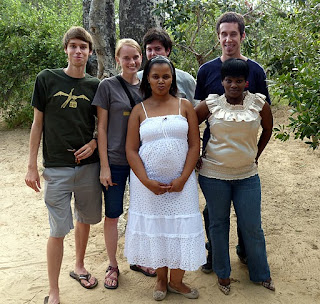As the semester has worn on and I have continued to experience a variety of opportunities that immerse me not only in Botswana health care but also in the social impacts of HIV/AIDS, I have begun to see that although there is a long list of beneficial national policies and noble NGOs, Botswana has a long way to go before it can relinquish the hold HIV has on the country.
Some campaigns have called for an “AIDS Free Generation” across Africa by 2015, which is a tall order, but Botswana, at least, may be well on its way. Precedents have been set for controlling and treating HIV, prevention programs are in place and global funds are surging into the area. Now, there just needs to be work done on the ground to implement this change and begin shifting the culture and behavior surrounding HIV.
Last week I had the good fortune of visiting an organization that is doing just this type of implementation through grassroots work that empowers kids and gives them a place to belong. The organization is called Stepping Stones International, and it is an NGO located in the town of Mochudi that works with orphaned children and children from destitute homes who have been made vulnerable because of how HIV hit their families, and now are at-risk to contract the disease themselves.
Here is the story of my trip to Mochudi…
I heard about Stepping Stones through a colleague at the Center for the Study of HIV/AIDS on campus, who put me in contact with Lila Pavey, one of the directors at Stepping Stones. Within a week of contacting her she asked me to come out and visit, and I couldn’t have been more excited to go.
To get to Mochudi I took a combi (a minibus that is a facet of public transport) to the main bus station, and then asked for the bus to Mochudi. The bus was only P9 ($1.50) and took about an hour to get to the town. As the bus approached Mochudi, some people were already getting off of the bus, and Lila had told me to get off at the Shell station, so when the bus passed a Shell station I hopped off. It turns out I got off one Shell station to early, however.
I needed to call Lila but my phone had conveniently run out of battery, so I went to the Shell station and asked how to get to Stepping Stones. After a short lesson in Setswana, one of the attendants pointed me to a combi that would go in the right direction. I used the combi driver’s phone to call Lila and tell her I would be late.
The driver said he knew the stop for Stepping Stones but when he left me off at a dirt road with no clear buildings in sight, I was skeptical. I followed the road anyway, and soon I ran into a group of young kids.
They were so excited to me (because of the welcoming air I give off or because I’m white is up for speculation) and we played catch with a homemade tape-ball and I taught them how to high-five. They all went crazy for high-fives after that and competed for space to slap my hand and one boy kept slapping harder and harder until I feigned an injury, which sent them into more of a frenzy. I said hello in Setswana and they answered, but then I said, “my name is Mike” in Setswana, and they echoed, “my name is Mike” in unison back to me, so I figured asking the way to Stepping Stones wouldn’t get me very far.
Luckily a woman walked by who pointed me in the right direction, and I strolled into Stepping Stones fashionably late (ironic not only because that rule doesn’t apply to meeting with the director of an NGO, but also because at that point my business casual attire was dusty and sweaty and far from fashionable). The place was bustling when I arrived because kids had just arrived from school. Lila was busy meeting with a new hire, and so she had one of the students take me on a tour.
His name was Thero (pronounced TAY-roh) and he was a fantastic tour guide. He was super enthusiastic and refreshingly straightforward and thoughtful with his words and actions. To be honest, he reminded me a lot of my cousin Marcus, from whom I’ve always felt I have a lot to learn because of his genuine warmth and kindness. Thero was off to a great start at drawing me towards Stepping Stones and its kids.
I learned that the kids are split up into groups and each group is assigned different chores each week. Thero was on dishes this week. There was also an inter-team competition and when teams did something well they got rocks placed in their corresponding buckets (a “ten points for Gryffindor” kind of thing). Thero’s team was winning.
Then I learned a little bit about a profit generation program they have in place for the kids. I only got the basics, but it sounds like they have some kids who make musical beats, and then some kids who promote them and some that work on the finances. Thero is currently a finance manager for the project, and I promised to buy a copy of the CD as soon as it dropped.
At this point I should explain further my interest in Stepping Stones.
The potential that I mentioned earlier for Botswana to turn the tables on its HIV epidemic had ignited in me the desire to contribute to its progress and give back to the community of which I had become a part. My schedule during the semester wasn’t very flexible, so I started thinking, only wishfully at first, about staying here for the winter (American summer) to volunteer.
A friend of mine who grew up in a developing country once warned me about my aspirations to one day work in a poor part of the world because of the sentiment in these countries that they don’t need Americans to come and save them. So I was wary of any plans to stay and volunteer in Botswana. But as I have continued to contemplate the idea, I feel like I’m not someone coming to save anybody, but rather just a person drawn to a cause who happens to be in a place where a lot of good is being done, and I feel like good could always use an extra hand.
So I was visiting Stepping Stones to inquire about a volunteer position for the few months I would have off between semesters.
When my tour with Thero was complete, I sat down with Lila to talk more about the details of the program, as well as what they were looking for in a volunteer. The conversation went well from my point of view, and although Lila couldn’t make the decision on her own, she gave the impression that Stepping Stones would have a spot for me.
After we talked, I got to sit in on one of the group lessons. Students were acting out role-playing activities relating to prevention of risky social and sexual behavior. In the role-playing, one person was an “instigator” who was trying to bring the other person home with them and the kids had to practice saying “no” to these kinds of people in an interactive setting.
The kids really liked it and were great actors and loved being dramatic and performing in front of their peers. In one of the role-plays, a guy and a girl rounded up some old pop cans and chip bags and the boy pretended to buy the girl lunch and they flirted and then he tried to get her to come home but she said no, very emphatically. It was so cute, yet striking, because the boy looked like he was 10 and was probably only 12 or 13 and was talking about sex and bringing girls home and had such a flare for the dramatic.
The next morning the kids were going to play soccer and then a talent promoter was coming to watch the kids dance and select some for a performance or music video. The more I heard about the healthy experiences Stepping Stones created for the kids, the more impressed I became.
At the end of the day Lila gave me a ride back to UB, so I avoided any more bus mishaps. She had amazing stories from her days in public health. She told of sexual abuse, of girls sleeping out for nights at a time who were much too young to do so, and other situations that Stepping Stones was working hard to avoid for its kids.
As I got home I realized I was completely hooked on Stepping Stones. I wanted to hang out with Thero again; I wanted to participate in role-playing activities (even if I couldn’t keep up with the Setswana); I wanted to help launch the new education center that was under construction. So I started looking into what I needed to do to extend my stay. As of yet I haven’t made a decision, and some things still need to fall into place, but I might be staying in Botswana for a little bit longer than expected.
As I stepped out of Lila’s car, I had just enough money for a bratwurst from one of the roadside stands, and it put a cap on a fantastic day.
Foot long bratwurst with onions, tomatoes and chili sauce for dinner…


















































